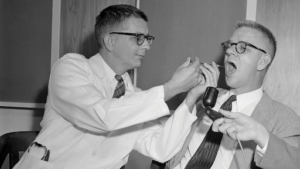Another Mystery Illness Rocks England After Spy’s Poisoning
Counterterrorism detectives and local police are investigating after a couple fall critically ill from exposure to an unknown substance a few miles from where a former Russian spy and his daughter were poisoned in March.AMESBURY, England—Four months after a quiet corner of England was plunged into a Cold War-style saga of spies, chemical weapons and international tensions, residents wondered Wednesday whether it was happening all over again.
Counterterrorism detectives and local police were investigating after a couple in their 40s fell critically ill from exposure to an unknown substance a few miles from where a former Russian spy and his daughter were poisoned with a nerve agent in March.
Scientists were working to identify the substance amid speculation the victims could have been sickened by residue from the poison that nearly killed Sergei and Yulia Skripal.
Wiltshire Police declared the case a “major incident” Wednesday, four days after the man and woman were found collapsed at a residential building in Amesbury, eight miles (13 kilometers) from Salisbury, where the Skripals were poisoned. A major incident designation allows British authorities to mobilize more than one emergency agency.
Residents felt a grim sense of deja vu.
“With the Russian attack happening not long ago, we just assumed the worst,” said student Chloe Edwards, who said police and fire engines descended on a quiet street of newly built homes in Amesbury on Saturday evening.
Edwards said she saw people in green suits — like those worn by forensics officers — and her family was told to stay indoors for several hours.
Police said officers were initially called Saturday morning about a collapsed woman, then were summoned back in the evening after a man fell ill at the same property. Police at first thought the couple, identified by friends as 44-year-old Dawn Sturgess and Charlie Rowley, 45, had taken a contaminated batch of heroin or crack.
“However, further testing is now ongoing to establish the substance which led to these patients becoming ill,” said Deputy Chief Constable Paul Mills. “At this stage it is not yet clear if a crime has been committed.”
London’s Metropolitan Police said that “given the recent events in Salisbury,” counterterrorism officers were working with local police on the investigation.
British media reported that samples of the mystery substance had been sent to the Porton Down defense research laboratory for testing.
Prime Minister Theresa May’s office said she was being kept updated on the case, “which understandably is being treated with the utmost seriousness.”
The emergency services’ response echoes that in the case of Sergei Skripal, 67. The former Russian intelligence officer was convicted of spying for Britain before coming to the U.K. as part of a 2010 prisoner swap.
He had been living in Salisbury, a cathedral city 90 miles (145 kilometers) southwest of London, when he was struck down along with his 33-year-old daughter Yulia, who was visiting him.
The Skripals’ illness initially baffled doctors after they were found unconscious on a park bench in Salisbury. Scientists at Porton Down concluded they had been poisoned with Novichok, a type of nerve agent developed by the Soviet Union during the Cold War.
After spending weeks in critical condition, the Skripals were released from the hospital and taken to an undisclosed location for their protection. Doctors say they don’t know what the long-term prognosis is.
Britain accuses Russia of poisoning the Skripals, a claim Moscow strongly denies. The case sparked a diplomatic crisis between Russia and the West, including the expulsion of hundreds of diplomats from both sides.
The two Amesbury victims were at Salisbury District Hospital, which also treated the Skripals. Police said the victims are British citizens and live in the area.
Neighbors on Muggleton Road in Amesbury, where Rowley is believed to live, said they did not know the couple well and didn’t know what they did for a living. Most residents have only recently moved to the new houses and apartments.
Sam Hobson, a friend of the couple, said he was with them on Saturday, when Sturgess fell ill first. He told Sky News she was “having a fit, foam coming out of her mouth.” Rowley collapsed later the same day.
“He was sweating loads, dribbling. … He was rocking backwards and forwards,” Hobson said. “There was no response from him. He didn’t even know I was there.”
Police cordoned off a home in Amesbury, believed to be Rowley’s, and other places the pair visited, including a church, a pharmacy and a park in Salisbury, near where the Skripals were found.
Health officials said there is not believed to be any wider risk to the public, but they continue to watch the situation.
Salisbury and surrounding towns have only recently begun to recover from the frightening weeks at the center of an international spy drama.
Police from 40 departments in England and Wales returned home in June after months working on the Skripal case, and specially trained workers have spent months decontaminating sites around the city.
The British government has pledged 2.5 million pounds ($3.3 million) to local businesses to make up for lost revenue in the area, which is a gateway to Stonehenge, the ancient stone circle that is a huge tourist destination.
“Amesbury’s a lovely place — it’s very quiet, uneventful,” said resident Rosemary Northing. “So for this to happen, and the media response and the uncertainty, it’s unsettling.”
Justin Doughty, who lives across the street from the cordoned-off house, said residents want more information from the authorities.
“We don’t know, to be honest now, because is it linked to Salisbury or is it drug-related?” he said. “None of us is being told anything by the police, and it would be nice to know something.”
___
Lawless reported from London. Danica Kirka in London contributed to this story.
Your support matters…Independent journalism is under threat and overshadowed by heavily funded mainstream media.
You can help level the playing field. Become a member.
Your tax-deductible contribution keeps us digging beneath the headlines to give you thought-provoking, investigative reporting and analysis that unearths what's really happening- without compromise.
Give today to support our courageous, independent journalists.






You need to be a supporter to comment.
There are currently no responses to this article.
Be the first to respond.